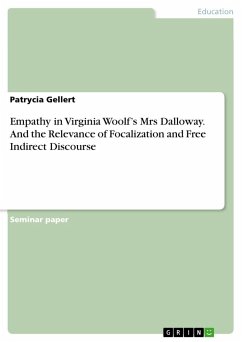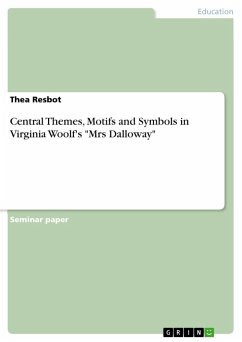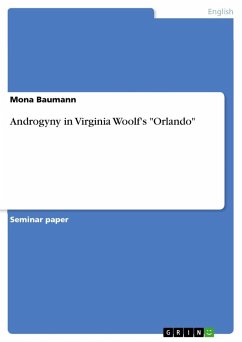
Empathy in Virginia Woolf's Mrs Dalloway. And the Relevance of Focalization and Free Indirect Discourse

PAYBACK Punkte
0 °P sammeln!
Seminar paper from the year 2016 in the subject Didactics - English - Literature, Works, grade: 1,0, University of Wuppertal, language: English, abstract: By immersing in a narrative, the readers' empathic imagination is encouraged, which leads to the process of accompanying characters or the narrator throughout the plot and seeing things from their perspectives, including any issue-influencing circumstances or occurrences whatsoever. Theories of art reception claim that people, readers and even cinema visitors, perceive and experience fiction 'through' the characters themselves, which, as a c...
Seminar paper from the year 2016 in the subject Didactics - English - Literature, Works, grade: 1,0, University of Wuppertal, language: English, abstract: By immersing in a narrative, the readers' empathic imagination is encouraged, which leads to the process of accompanying characters or the narrator throughout the plot and seeing things from their perspectives, including any issue-influencing circumstances or occurrences whatsoever. Theories of art reception claim that people, readers and even cinema visitors, perceive and experience fiction 'through' the characters themselves, which, as a consequence, makes people relate to them and sympathetically take part in their experiences and actions. Literary fiction, therefore, can serve as an experiment, by which the reader either generates propinquity or distance towards certain characters or events. Different literary techniques prompt the reader to make cognitive conclusions and thereby train their cognitive abilities and the theory of mind. According to Vera Nünning, reading fiction, hence, enables people to "[...] simulate the thoughts and feelings of others [...]" and elicits spontaneous perspective-taking, meaning that reading spurs the readers to take the point of view of certain characters or the narrator. This goes along with the necessity of understanding the characters' or narrator's motivations, thoughts and emotions in order to make sense of the story as a whole. In literary fiction, this process is implemented by various narrative techniques which either support or inhibit the readers' empathic sharing. Referring to Nünning, the three strategies which support perspective-taking are focalization, engrossing comments by an overt, heterodiegetic narrator and the generation of suspense by, for example, exposing characters to dangerous situations. Focalization, above all, guides the readers' fictional experience on an elementary level, enables the reader to fully take over the perspective of one or more characters and to "[...] simulate their thoughts and feelings [...]". The strategy which the analytical part of this essay is based on is the former. With the aim to confirm the proposition that internal focalization, more specifically, free indirect discourse in Virginia Woolf's Mrs Dalloway, triggers empathy on the part of the reader, three exemplary passages of Mrs Dalloway will be analyzed and examined regarding empathy/ perspective-taking. Prior to the analytical part, definitions of empathy as opposed to sympathy and emotional contagion, focalization and free indirect discourse will be provided.













